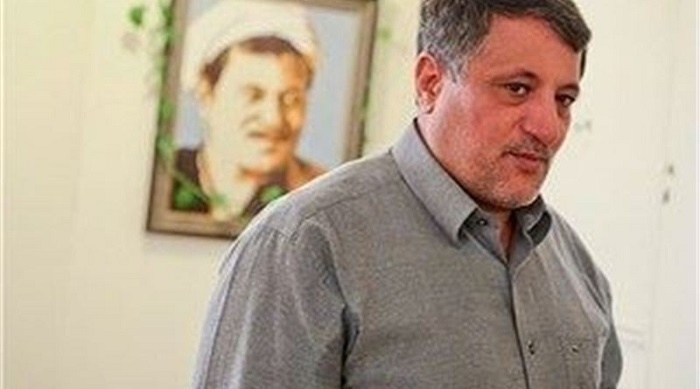Can Tehran City Council Catapult the Younger Hashemi Rafsanjani onto the Political Stage?

Mohsen Hashemi Rafsanjani, the eldest son of the late Akbar Hashemi Rafsanjani, was unanimously voted in as chairman of Tehran’s Fifth City Council on Saturday. The forerunner in Tehran’s city council election that was held in June this year, Hashemi was chosen for the position in presence of heavyweights such as Ahmad Masjed Jamei, leader of the Reformist faction in the council in the two previous terms, and Morteza Alviri, mayor of Iran’s capital from 1999 to 2002.
Following the sweeping victory of Reformists in the fifth city council election where they secured all 21 seats, dominating the body after 14 years, election of the next mayor, successor to Principlist Mohammad-Baqer Qalibaf, was the most important on the agenda.
Mohsen Hashemi Rafsanjani, who served as CEO of Tehran Urban and Suburban Railway Operation Company for thirteen years from 1997 to 2010, was the most popular choice initially. Nonetheless, his resignation from the council to become the next mayor of the capital meant that the first alternate council member, Principlist Mehdi Chamran, three-time chairman of the Tehran City Council, would join the 21-member assembly; hence, Hashemi’s decision to continue serving as a council member.
Mahmoud Hojjati, Habibollah Bitaraf, and Mohammad Shariatmadari were three veteran executives groomed for the post afterwards, but neither of them showed willingness to accept the offer. All three are now nominated for ministerial portfolios in Hassan Rouhani’s second administration, waiting for the parliament’s vote of confidence. The next group of candidates for the post were former Education Minister Mohammad-Ali Najafi, former MP Hossein Marashi (also a close relative of Akbar Hashemi Rafsanjani), Reformist former MP Mrs. Elaheh Koulaei, veteran bureaucrat Mohsen Mehralizade, and a lesser known figure, Mohammad-Ali Afshani. Eventually, as it transpired that Najafi is the preferred candidate for council members, other nominees stepped down in his favor and Mohammad-Ali Najafi was elected as successor to Baqer Qalibaf with a unanimous vote by the council on August 10.
On Saturday, Mohsen Hashemi Rafsanjani was unanimously elected as chairman of the council. Morteza Alviri and Ahmad Masjed-Jamei, two other candidates for the position, officially stepped down in the beginning of the Saturday session, in a show of solidarity inside an all-Reformist council. Seyyed Ebrahim Amini was also elected as vice-chairman with 21 votes.
Born in the holy city of Qom in 1961, Mohsen Hashemi served as CEO of Tehran Urban and Suburban Railway Operation Company for thirteen years before resigning in 2010. In the fifth city council election, he proved the most popular candidate with 1,756,086 votes, the highest number of votes any individual has ever collected in the race. Mohsen Hashemi was Reformists’ favorite candidate for mayoralty also in the Fourth City Council, but lost the competition to the incumbent Mohammad-Baqer Qalibaf with a one-vote margin [in a controversial vote-taking which saw a member of the Reformist slate switch allegiance in the last minute].
Hashemi’s election to the position of chairman is an apt choice as his impressive vote in the election made him suitable for either of the two top positions in Tehran’s governance system, i.e. mayoralty or chairmanship.
While Mohsen Hashemi had announced no commitments, either in front of other members of the Reformist slate or the Reformists’ Supreme Council for Policy-Making, not to nominate himself for the vied-for post of Tehran mayor, and held a high chance to secure the post, he nonetheless respected the demand and abstained participation in the competition.
Mohsen Hashemi also holds an impressive record during his service in Tehran metro company. His thirteen years of service in the office is known as its golden years. Hashemi’s serious contender for the position of Tehran City Council chairmanship, Morteza Alviri, had served as mayor of Tehran from 1999 to 2002, without leaving a positive record.
Analysts believe that as the eldest son of Akbar Hashemi Rafsanjani (a ‘pillar’ of the Islamic Republic), Mohsen Hashemi is following his father’s political path. In this light, the younger Hashemi’s chairmanship over the city council is seen as the start of a new chapter in his political life.
Hashemi also serves as chairman of the central council of Executives of Construction, political party known as brainchild of Akbar Hashemi Rafsanjani, VP Eshaq Jahangiri from the post. As the new chairman of the Tehran City Council, Mohsen Hashemi can now play a more serious political role. He has also proven to act within the accepted boundaries of the establishment and enjoys warm relations with higher echelons of the Islamic Republic.
Many analysts believe that in terms of political approach, Mohsen is the closest figure to his late father and is ready to play a stronger political role. Some even saw him as the fittest candidate for the 1400 presidential election, for which service in Tehran Municipality could serve as a springboard. Can the chairmanship position serve a similar function?
* This piece was originally published in Tabnak, moderate Principlist website affiliated with former IRGC commander Mohsen Rezaei. Minor modifications have been made to render the text comprehensible for international readers.

